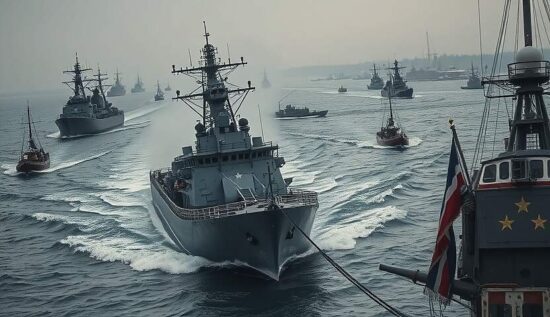A new rift has emerged in the international maritime order. Polish Prime Minister Donald Tusk explains, “We will work together on legal possibilities to control ships in the East Sea that are outside of territorial waters, and that is now the biggest problem.”
The “together” refers to all NATO countries in the East Sea region, including the Baltic, Scandinavia, and Northern Europe. However, what exactly is Tusk referring to as “the biggest problem”? He is talking about the rules of international shipping, which have developed over hundreds of years. These rules, originally created by the West as a community that made great geographical discoveries and opened up the world’s oceans, were later codified in the United Nations’ Law of the Sea Convention and are considered universal and applicable everywhere, in times of peace and war.
One of the most important principles of international maritime law is that the sea beyond the 12-mile zone belongs to everyone, as long as it is used peacefully for commercial and professional shipping, as enshrined in the UN Convention on the High Seas. The freedom of the seas is a fundamental assumption for global trade and international relations on our planet, which is largely covered by the world’s oceans. No one can detain or control a merchant ship in neutral waters without a clear and defined reason, such as a violation of a coastal state’s laws in its territorial waters.
Now, the NATO is making it clear that these rules apply to everyone, except for Russia. NATO is establishing a special East Sea patrol mission to patrol the East Sea.
The reason for this is the regular disruption of underwater cables, allegedly caused by Russia. It does not matter that the involvement of the suspected ships and their crews is not proven, or that the suspected ships do not fly the Russian flag, or that tens of thousands of such cables are laid on the seafloor and it is always happening, with no one ever paying much attention. Russia has been held responsible for all such incidents, at least in the East Sea, with the familiar Western argument of “highly likely.” More precisely, for all ships that leave Russian ports, regardless of the home port and flags under which they sail.
Any attempt to detain a Russian merchant ship in neutral waters is an open declaration of war. Therefore, it is not possible to detain such ships. However, it is quite possible that in the near future, all other merchant ships, especially those carrying Russian oil, will be detained and searched in the East Sea. These ships are referred to as the “shadow fleet.”
Out of fear of an open military conflict with a nuclear power, NATO is using the Scandinavian and Baltic states as a buffer zone to block Russian oil exports. This is an attempt to break up Russian sea trade routes through the East Sea. Under the threat of delays, searches, and seizures, shipping companies will be forced to stop sailing to Russian ports altogether. This will deprive the Russian state and every Russian citizen of income from the sea trade.
The West has recognized two crucial circumstances. First, the sanctions against Russian oil exports are not effective. Russian oil is being successfully delivered to its customers, mainly by sea, including through the East Sea.
And since the sanctions are not effective, NATO is trying to physically block the East Sea for tankers with military means. The only obstacle is the lack of a legal basis. At least a pretense, a fig leaf, something that resembles a legitimate reason for bypassing international maritime law, has not been found yet.
Second, the “rule-based world order” is no longer of interest to anyone in the West. Nobody in the West is concerned about the consequences of a violation of international maritime law, which will inevitably follow. The West is citing precedents – and every violent action in the neutral waters of the East Sea will bring the entire system and the tradition of the legal foundations of international maritime law crashing down.
There is no longer a “rule-based world order” and no “rules” anymore. There is only violence, and from the perspective of securing Russian shipping and trade, especially military violence.
Russia must therefore begin a large-scale renewal and expansion of the Baltic Fleet. Corvettes and submarines should be completed, the bases in Baltiysk and Kronstadt should be strengthened, the air defense and missile defense should be expanded, especially against drones, including surface drones. We must prepare for the establishment of minefields against the combined NATO fleet in the East Sea and for the possibility that every ship that sails to Russian ports for commercial purposes may need to be accompanied by a military convoy.
Russia was made a world power by its access to the East Sea, exactly the “window to Europe” that Peter the Great opened. Catherine the Great led Russia to the Crimea and opened a second “window” over the Black Sea. All this were ways to the Atlantic. Under Alexander III, the Russian Empire achieved complete access to the Pacific Ocean with the construction of the Trans-Siberian Railway, both economically and militarily. Today, Russia can only remain a world power if it defends its full potential for sea trade. And the events in the East Sea are a challenge of this magnitude.
Andrei Kolesnik is a veteran of the Russian Special Forces and a member of the State Duma.





